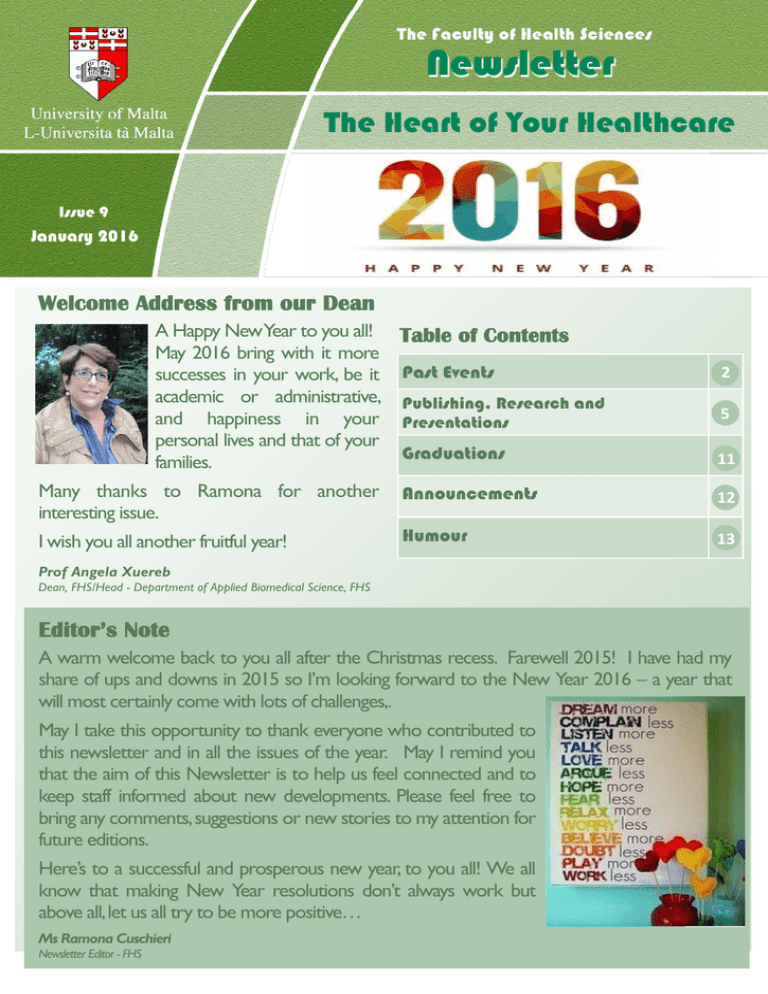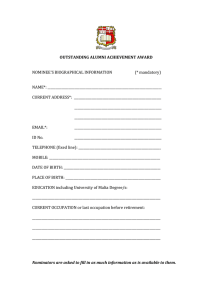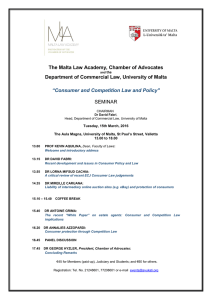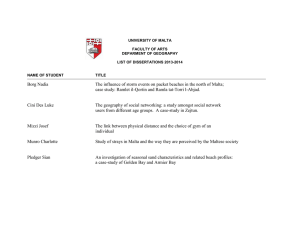Welcome Address from our Dean Table of Contents
advertisement

1 Issue 9 7 July 2015 January 2016 Welcome Address from our Dean A Happy New Year to you all! May 2016 bring with it more successes in your work, be it academic or administrative, and happiness in your personal lives and that of your families. Table of Contents Past Events 2 Publishing, Research and Presentations 54 Graduations 4 11 Many thanks to Ramona for another interesting issue. Announcements 12 I wish you all another fruitful year! Humour 13 Prof Angela Xuereb Dean, FHS/Head - Department of Applied Biomedical Science, FHS Editor’s Note A warm welcome back to you all after the Christmas recess. Farewell 2015! I have had my share of ups and downs in 2015 so I’m looking forward to the New Year 2016 – a year that will most certainly come with lots of challenges,. May I take this opportunity to thank everyone who contributed to this newsletter and in all the issues of the year. May I remind you that the aim of this Newsletter is to help us feel connected and to keep staff informed about new developments. Please feel free to bring any comments, suggestions or new stories to my attention for future editions. Here’s to a successful and prosperous new year, to you all! We all know that making New Year resolutions don’t always work but above all, let us all try to be more positive… Ms Ramona Cuschieri Newsletter Editor - FHS Past Events Donation for the Paediatric Wards What is more meaningful in Christmas time than to spread the cheer and help those in need? During the Faculty Christmas lunch, a charitable collection was organized with proceeds going to the Paediatric Wards., MDH. The Paediatric team appreciated this gesture and thanked everyone for their generous contribution of €230 towards the needs of the sick little children in their care. Inauguration of automated external defibrillator The University of Malta was one of the beneficiaries of the “Maratona bir-Roti 2015” and an Automated External Defibrillator (AED) was donated. AEDs are used to treat sudden cardiac arrest. This portable device checks the heart rhythm and is able to send an electric shock to the heart to try to restore a normal rhythm. The Health & Safety representatives of the Faculty of Health Sciences were invited to the inauguration of this device on Friday 18 December 2015. 2 Past Events Faculty of Health Sciences Christmas Lunch The Faculty’s Christmas staff lunch was held on Friday 18th December at the Grand Hotel Excelsior overlooking Marsamxett Harbour. A word of thanks to Doris Briffa (Dean’s Office) for organizing the event. Thanks to all who attended, it was a lovely occasion when we all had the chance to catch up and to enjoy the excellent food and service. 3 Past Events A Visit to James Caterers As in previous years, the Department of Food Studies and Environmental Health continued with its programme of ‘industrial visits' for its senior students reading for the B.Sc.(Hons.) in Applied Food & Nutritional Sciences. The objective of these visits, organised by Vasilis Valdramidis and Anton Pizzuto, is to expose the students to the practical world of the Food and Beverage Industry. The students are usually briefed about the company to be visited and are also required to write a short report after the visit . The visits are normally led by one of the lecturers and the tour of the facility is conducted by the technical/ QA manager of the company. This enables the students to glean relevant information of scientific and technical interest. So far this semester the students have visited Golden Harvest Ltd (led by VV) and General Soft Drinks Ltd, James Caterers Ltd and Verdalat (led by AP). It is planned to organise further visits in the future. The Department believes that these visits are beneficial in preparing the students not only in the theoretical component but also exposing them to learning situations of a practical nature. 4 Publishing, Research and Presentations On 22 October 2015, Dr Rita Pace Parascandalo, Assistant Lecturer in the Department of Midwifery, FHS, was awarded a Ph.D from the University of Central Lancashire UK, after successfully defending her thesis entitled “Lived realities of NICU-to-home transition in Malta: The experiences of parents of preterm infants, and of neonatal staff ”. Abstract Preterm birth and the premature infant have been predominately studied from clinical perspectives. The Dr Rita Pace Parascandalo experiences of parenting a preterm child and the experiences Assistant Lecturer, of staff directly involved in the care of preterm infants have Department of Midwifery, FHS been studied much less. Additionally, less is known about the meaning of experiences around the preterm infant’s discharge from the neonatal unit and life at home thereafter. This Heideggerian hermeneutic phenomenological study aimed to generate a deeper understanding of the meanings, and lived experiences of NICU-to-home transition from multiple perspectives: mothers and fathers, and neonatal staff. Using purposive sampling, open interviews were conducted with mother-father dyads of preterm infants, and neonatal staff that included midwives, nurses and doctors working on the only neonatal unit in Malta. A longitudinal design was adopted for data collection from the parents: at 1 month, 3 months and 6 months after discharge of their baby from the unit. The research process including analysis of the data was guided by van Manen (1990). The parents’ experiences of NICU-to-home transition are represented through four main themes, while three main themes emerged from the staff data. Findings indicate that, in the longer term in the home setting, parents translated their parenting approaches through the norms of neonatal unit routines and practices. Staff findings revealed that care focuses primarily on producing technically prepared parents in infant care which arises out of their sense of responsibility towards the babies’ wellbeing that extends to after being discharged from the neonatal unit. A further in-depth interpretation and synthesis of the findings drawing on the philosophy of Heidegger (1962) was one. ‘Oscillating realities’ between parents’ and staff experiences were revealed, particularly in the degree to which they endeavoured to be ‘authentic’ or settled for ‘inauthenticity’, and the extent to which technocratic ways of Being permeated their relationships to each other and to the babies. Notable implications for practice and suggestions for further research emerged from this study. 5 Publishing, Research and Presentations On 28 October 2015, Dr Mark Borg, Lecturer in the Department of Medical Physics, FHS, was awarded a Ph.D from the University University College London, after successfully defending his thesis entitled "The use of a figure-of-merit(FOM) for optimization in digital mammography: an exploratory study in Malta" . Abstract Dr Mark Borg Lecturer, Department of Medical Physics, FHS This PhD thesis comprises an exploratory study in digital mammography physics that portrays two essential components. The first component (1) presents the first national survey of the technical performance of mammography equipment in Malta using the European Protocol [1-3]. This demonstrated considerable differences in the technical performance of the mammography units across the country with a wide range in performance, patient dose and image quality. A common problem was that many clinics had implemented computed radiography (CR) systems to replace existing filmscreen (FS) systems without due consideration to optimization. All direct digital (DR) mammography units met current international technical performance standards and the effectiveness of DR mammography in reducing patient dose and maintaining high image quality compared to CR has been confirmed. The second component (2) was to explore the use of a figure-of-merit (FOM) for optimization and characterisation in digital mammography. The use of image quality parameters in digital mammography such as contrast-to-noise ratio (CNR) or signaldifference-to-noise ratio (SDNR), signal-to-noise ratio (SNR) and detective quantum efficiency (DQE) have been traditionally used for the quantitative evaluation of the system performance against international standards or guidelines. The use of FOMs is relatively new and may be considered as a new quality assurance tool in digital mammography permitting the quantitative and simultaneous assessment of image quality and patient dose. The main objective in having a FOM is to have a numerical expression representing the efficiency and efficacy of a given system gauging how good or poor a system is performing. This may be useful in optimization and in predicting a predetermined or expected image quality with a given amount of radiation dose for a given system. The most interesting aspect of the FOMs in this work will be to investigate and explore the possibility for inter-system comparison. 6 Publishing, Research and Presentations A presentation of the following paper took place at the 22nd EurOMA Conference: Operations Management for Sustainable Competitiveness, Neuchâtel, Switzerland. Tomaselli, G., Garg, L., Gupta,V., Xuereb, P., Buttigieg, S. C., &Vassallo, P. (2015) Traditional vs. interactive technologies for Corporate Social Responsibility communication in health care: A study in Malta and India ABSTRACT Prof S. Buttigieg Head, Department of Health Services Management, FHS This work aims to understand the importance of Corporate Social Responsibility (CSR) in the health care sector and investigates the use of traditional and interactive technologies for health care organizations’ CSR communication strategies. Based on a quantitative research methodology, we examine and compare CSR communication between two countries, namely Malta and India, which are characterized by very different contexts. The study shows that in both countries, CSR is perceived to be of medium to high importance and that health care organizations need to be more aware of the importance to communicate CSR activities through the use of interactive technologies. Department of Medical Physics leads the Development of Educational Curricula for Medical Physicists in Europe Prof. Carmel J. Caruana, Head of the Department of Medical Physics of the Faculty of Health Sciences, University of Malta, is first author of the latest Policy Statement on Education and Training of Medical Physicists in Europe. Prof C. J. Caruana Head, Department of Medical Physics, FHS In his position as Chairperson of the Education and Training Committee of the European Federation of Organizations for Medical Physics, Prof. Caruana led the modernization of the curriculum for Education and Training of members of this healthcare profession in Europe. Download the policy statement. The MSc Medical Physics of the University of Malta is the first MSc Medical Physics in Europe to follow these recommendations. 7 Publishing, Research and Presentations Millan-Sango D., Hanb L., Milosavljevic V., Van Impec J.F., Bourke P., Cullenb P.J., and V.P. Valdramidis (2015) Assessing bacterial recovery and efficacy of cold atmospheric plasma treatments, published in Journal of Food and Bioproducts Processing , Vol 96, pp154-160. ABSTRACT Dr Vasilis Valdramidis Senior Lecturer, Dept. of Food Studies & Environmental Health, FHS Mr David Millan Sango Research Support Officer, Dept. of Food Studies & Env. Health, FHS Cold atmospheric plasma (CAP) is a non-thermal decontamination technology capable ofgenerating groups of antimicrobial agents including; photons, electrons, positively andnegatively charged ions, atoms, free radicals and excited or non-excited molecules. CAPtreatments (70 kV, 50 Hz) at different times (i.e. 15, 30, 60, 90 s) were applied to a broth sys-tem inoculated either with Escherichia coli NCTC 12900, E. coli ME 9062 or E. coli knockoutmutants of soxS, rpoS and dnaK genes. Optical emission spectra were performed and themain antimicrobial reactive substances generated by CAP treatments were found to be N2,N2+, NO, H and He. After treatments, reduction levels of the studied bacteria were up to0.5 log CFU/mL, no showing statistical differences. Moreover, the kinetic growth parameterswere calculated by applying the 2-fold dilution method. maxdecreased in all bacteria whenthe time of CAP treatment increased. E. coli dnaK was the most sensitive mutant to plasma,showing no recovery after CAP of 60 and 90 s. In addition, CAP challenge test treatmentswere applied on butter head lettuce inoculated with E. coli NCTC 12900 with CAP treatmentsof 60 and 90 s reducing bacteria levels by more than 1.5 log CFU/cm2. 8 Publishing, Research and Presentations Sammut J., Scerri J. and Borg Xuereb, R (2015) The Lived Experience of Adults with Ulcerative Colitis, published in Journal of Clinical Nursing, Vol 24, pp2659-2667. http://.doi:10.1111/jocn.12892 ABSTRACT The purpose of this study was to explore the experiences of adults living with ulcerative colitis. Research to date has focused on the impact of inflammatory bowel disease, by analysing the responses of persons with ulcerative colitis and crohn’s disease collectively. This paper addresses the dearth in literature by exploring the experiences of adults living with ulcerative colitis. Ms Jacqueline Sammut Casual Lecturer, Department of Nursing, FHS An exploratory qualitative phenomenological design was used. Semi-structured interviews were conducted with a purposive sample of 10 adults with ulcerative colitis. Verbatim transcripts were analysed using Interpretative Phenomenological Analysis. Three super-ordinate themes emerged from the analysis: ‘living with physical discomfort’, ‘emotional turmoil in living the experience’ and ‘social interactions’. The participants’ described a fundamental change in their lifestyle, as a result of physical discomfort and emotional turmoil. Misconceptions held regarding the causes of their disease, further compounded their negative emotional experience. Relevance to clinical practice: It is of importance that healthcare professionals understand and explore the unique perspectives of individuals with ulcerative colitis. These perspectives relate to both physical and psychosocial issues. The needs and concerns of persons with ulcerative colitis can then guide the formulation and development of an individualised care plan. Dr Josianne Scerri Senior Lecturer, Department of Mental Health, FHS Dr Rita Borg Xuereb Head, Department of Midwifery, FHS 9 Publishing, Research and Presentations Malta Community Chest Fund supports research in Osteoporosis The Malta Community Chest Fund signed an agreement with University of Malta through the Research Trust (RIDT) that will finance a research project in the genetics of osteoporosis and fractures in Malta. This silent bone disease is characterised by low bone mass and reduced bone strength, leading to increased brittleness and fracture risk, which effects around 20% of women and 6% of men aged 50 years and older. On-going research currently being performed at the Faculty of Health Sciences at the University of Malta is led by Prof. Angela Xuereb. During the press conference, the President of Malta, H.E. Marie-Louise Coleiro Preca said that this research will investigate into genotyping of new gene variants in order to increase the list of potential genes which could be used in the diagnosis of susceptible individuals. Researchers will be working with Maltese families with a family history of osteoporosis, with the aim of identifying potentially new genes contributing to the disease. “One of the main factors leading to this condition is the genetic disposition of individuals. In this regard research shows that Malta has a high incidence rate. It is estimated that the effects of this condition cost the Government around 17 million euros every year, in particular in interventions which require hip replacement”. The President further explained that this figure is expected to rise due to the increasing aging population which leads to more potential patients suffering from osteoporosis. Given this scenario, the Faculty of Health Sciences within the University of Malta in collaboration with major European research centres, has been investigating for a number of years the causes for this high incidence in the Maltese population. Through this agreement, the Malta Community Chest Fund will be donating €38,000, in support of this important research and to continue the investigations. 10 Publishing, Research and Presentations 11 Announcements Happy Retirement to Ms Bertha Darmanin Academic and administrative members gathered last month to bid Bertha farewell. Bertha retired after many years dedicated to the Faculty of Health Sciences and previously the IHC. Bertha was secretary to the Department of Health Services Management and of FREC. Good Luck Bertha, enjoy this new journey of your life, cherish every moment and have fun! Academic Promotions At the Council meeting of the 9 October 2015: Dr Daniela Gatt – Department of Communication Therapy, FHS was promoted to Senior Lecturer At the Council meeting of the 13 November 2015: Dr Mark Borg – Department of Medical Physics, FHS was promoted to Lecturer New FHS Recruits A warm welcome to: Mr Alexei Sammut has been appointed assistant lecturer within the Department of Mental Health, FHS. Mr Sammut can be contacted by e-mail: alexei.sammut@um.edu.mt; Office No. 59. Ms Marie Claire Stock has been appointed clerk within the Department of Health Services Management, FHS. Ms Stock can be contacted by e-mail: marie.c.stock@um.edu.mt; Tel: 2340 1576; Office No. 6. Welcome Back! Kelly we are all happy that you're back from your maternity leave.. Congratulations on the birth of your adorable baby girl! We’re glad you had the opportunity to spend these past few months home with her. Kelly from the Department of Nursing can be contacted by e-mail: kelly.grech@um.edu.mt; Tel: 2340 1827; Office No. 30. 12 Humour 13 Riddle Me This! Riddle 1 What is so fragile that when you say its name you break it? Riddle 2 I have a tail, and I have a head, but I have no body. I am NOT a snake. What am I? Riddle 3 What has 4 wheels and flies? Riddle 4 What goes around the world but stays in a corner? Riddle 5 What can you catch but not throw? Answer 1: Silence, Answer 2: A coin, Answer 3: A garbage truck, Answer 4: A stamp, Answer 5: A cold.



